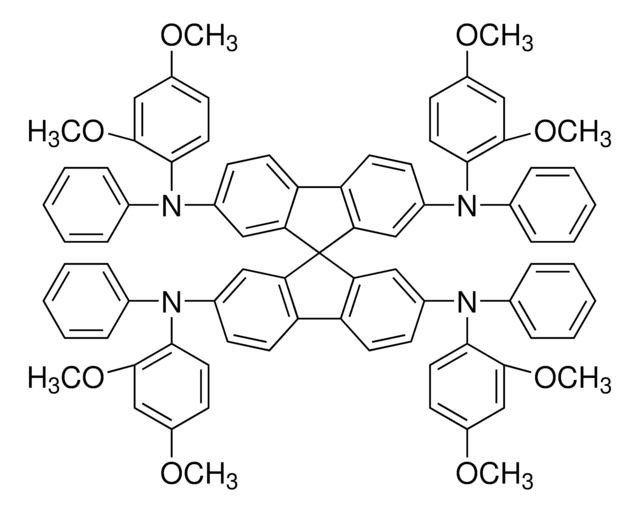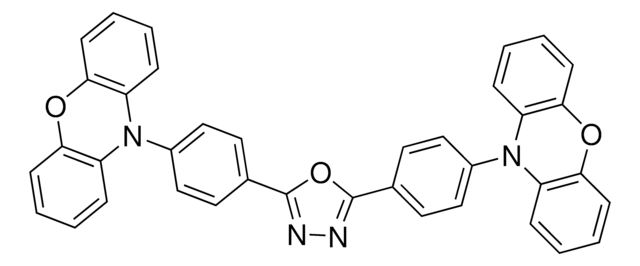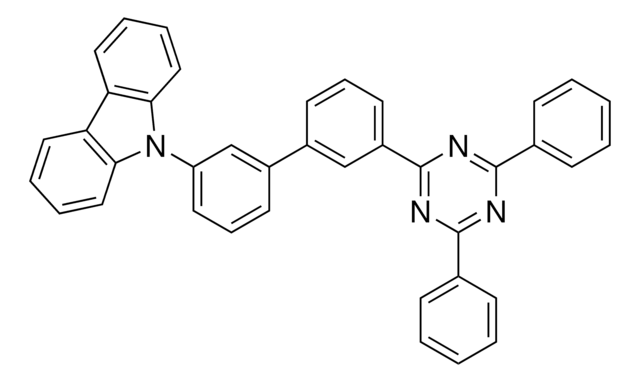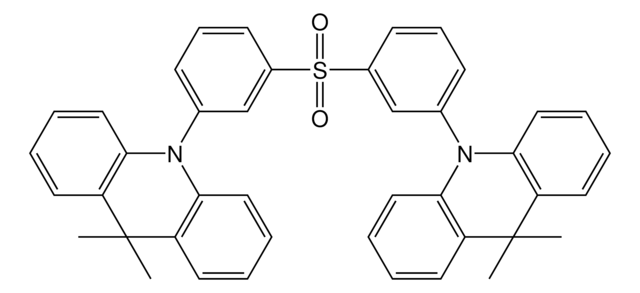906018
Spiro[9H-fluorene-9,9′-[9H]xanthene]-2,2′,7,7′-tetramine
Synonym(s):
N2,N2,N7,N7,N2′,N2′,N7′,N7′-octakis(4-methoxyphenyl)spiro[9H-fluorene-9,9′-[9H]xanthene]-2,2′,7,7′-tetramine, X60
About This Item
Recommended Products
Assay
>98%
form
solid
color
beige
SMILES string
COC1=CC=C(C=C1)N(C2=CC=C(OC)C=C2)C3=CC=C4C(C5(C6=CC(N(C7=CC=C(OC)C=C7)C8=CC=C(OC)C=C8)=CC=C6OC9=CC=C(N(C%10=CC=C(OC)C=C%10)C%11=CC=C(OC)C=C%11)C=C59)C%12=CC(N(C%13=CC=C(OC)C=C%13)C%14=CC=C(OC)C=C%14)=CC=C4%12)=C3
General description
X60 is a spiro[fluorene-9,9′-xanthene] (SFX) based organic hole transport material (HTM).
Devices with X60 as HTM showed high power conversion efficiencies (PCEs) amounting to 7.30% in solid-state dye-sensitized solar cells (ssDSCs) and 19.84% in perovskite solar cells (PSCs). These results are competitive with the reported record PCEs of ssDSC and PSC devices based on the well-known HTM Spiro-OMeTAD. In addition, almost no hysteretic behavior could be observed in the X60-based PSCs, and the photovoltaic parameters of the devices are not affected by the scan rates used.
Application
Storage Class Code
11 - Combustible Solids
WGK
WGK 3
Flash Point(F)
Not applicable
Flash Point(C)
Not applicable
Choose from one of the most recent versions:
Certificates of Analysis (COA)
Sorry, we don't have COAs for this product available online at this time.
If you need assistance, please contact Customer Support.
Already Own This Product?
Find documentation for the products that you have recently purchased in the Document Library.
Articles
Professor Chen (Nankai University, China) and his team explain the strategies behind their recent record-breaking organic solar cells, reaching a power conversion efficiency of 17.3%.
Our team of scientists has experience in all areas of research including Life Science, Material Science, Chemical Synthesis, Chromatography, Analytical and many others.
Contact Technical Service
![Spiro[9H-fluorene-9,9′-[9H]xanthene]-2,7-diamine](/deepweb/assets/sigmaaldrich/product/structures/307/234/46c07f0c-9242-4c0b-8994-8121690da3c9/640/46c07f0c-9242-4c0b-8994-8121690da3c9.png)

![Tris[2-(p-tolyl)pyridine]iridium(III) ≥99% (HPLC)](/deepweb/assets/sigmaaldrich/product/structures/207/957/bb807380-3690-46c2-809e-e6bc2ba29fa5/640/bb807380-3690-46c2-809e-e6bc2ba29fa5.png)

![9,9-Bis[4-[(4-ethenylphenyl)methoxy]phenyl]-N2,N7-di-1-naphthalenyl-N2,N7-diphenyl-9H-Fluorene-2,7-diamine ≥98% (HPLC)](/deepweb/assets/sigmaaldrich/product/structures/217/694/0386f9cf-a92c-48f3-bde7-f7a23d7cdc3a/640/0386f9cf-a92c-48f3-bde7-f7a23d7cdc3a.png)


